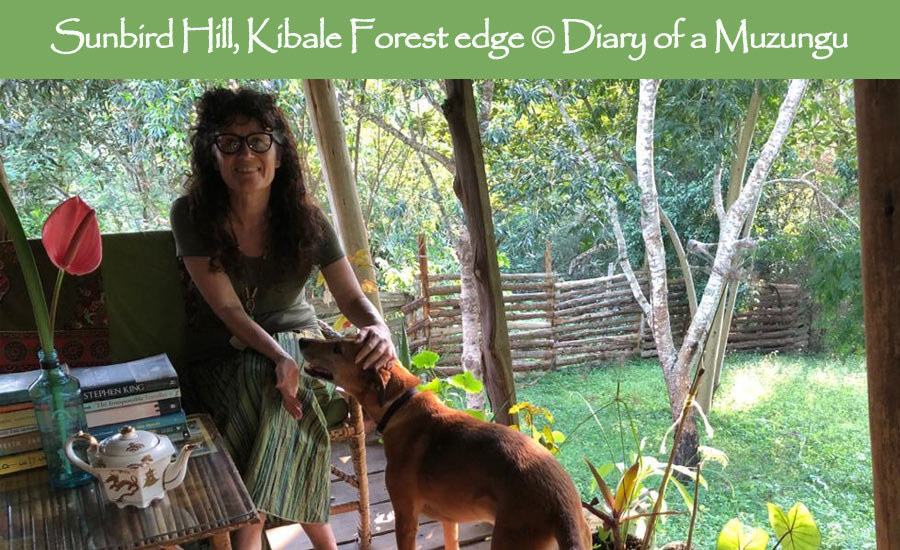
A year locked down with nature: Kibale Forest birds – and the occasional rat!
As we approach the one-year anniversary of Uganda’s lockdown, I take a moment to record the everyday sights and sounds of life in my wooden house on the edge of Kibale National Park. It’s easy to forget how different my life is to most people’s. Will I ever live in a modern apartment block again, I wonder?
One of my favourite forest noises is the lead-coloured flycatcher, whose two-tone call is my morning alarm. I don’t want to miss a note of the dawn chorus; in fact, it’s the first thing I miss when I travel. The rich birdsong is the most heartrendingly beautiful start to my day. Nowhere in Uganda can match Kibale Forest for birdsong!
There is little to keep us awake at night, bar the sounds of the forest. Being close to the Rwenzori Mountains, we are also treated to the occasional SHUDDER of an earth tremor. Believe me dear reader, the earth really does move in these parts!

Other night-time noises from the edge of Kibale Forest include Wood Owls, Verreau’s Eagle Owls and Black-shouldered Nightjars. The bark of the bushbuck, the YAHOO of baboons and the eerie calls of the Black and White Colobus Monkeys punctuate the night. This morning we were woken by chimpanzees (jealously guarding a fruiting fig tree); frogs can make a racket too! Sometimes we hear elephants, or at least we are alerted to their presence: the sound of ululating children and the loud banging of jerry cans is the usual signal that we have elephant visitors. They are mostly silent but for the rhythmic swish… swish… swish… as they push through three-metre high grass. When the elephants get too close to our neighbours’ crops, rangers sound warning shots into the air. (Once the elephants were so close to my house, I swear I felt the ground tremble). Once in a while, we hear the splintering of wood as elephants fell trees.
Occasionally, we hear the noise of a container lorry moving over the speed humps that stud the road that runs through Kibale Forest. (Thankfully, we don’t hear them often).
My mornings start with a pot of tea on my balcony (after a quick glance at the floor to see which moths the bat has been eating from its roost high in my thatch!)
Early morning sounds vary according to the season. There are birds galore! The high-pitched twittering of Sunbirds, the squawking of Great Blue Turacos and the whistle of African Grey Parrots are joined by gregarious Black and White Casqued Hornbills that bang their cumbersome-looking beaks against tree trunks as they wipe them clean. Kibale Forest’s birds enthrall me! Primates are infrequent visitors to the family compound but Red-tailed Monkeys are known to raid the fig tree just before dawn (before the dogs wake up!)
Geckos are welcome housemates (they love eating mosquitoes!) They nest in the thatch and I often find their perfectly round white eggs on my wooden floor. Occasionally the eggs splatter to reveal their runny yellow yolk.
A rustle in the thatch generally denotes a gecko so it’s a sound I usually ignore, until recently when something bigger than a gecko moved noisily above my head. The small hole at the apex of the thatch lets in a few inches of light; next to it was the squirming black body of a medium-sized snake, coiled along the rafters! I imagine it had been sunbathing on my roof. (The grass is ordered and we’ll be sealing that hole in the thatch very soon Ma!)
While it’s still cool, I explore the forest edge. “You do know elephants blocked our way last night, don’t you?” Julia tells me. “Well, I do now!”
My morning walk-cum-runs along the edge of Kibale National Park have kept me sane this past year. My series of #LockdownDiaries are inspired by the healing effects of nature. Every day is different, should you choose to notice it: I have learned that rare L’Hoest’s Monkeys do visit the forest edge occasionally; I know that ‘cuckoos follow the caterpillars’ meaning hear a cuckoo and you will notice the caterpillars; it also means peak butterfly season is approaching.
A few days ago I had to do a quick U-turn when I saw three chimpanzees along the path ahead of me. During lockdown, the paths became so overgrown and unused that I would run through ten spiders’ webs every morning. (I could dedicate a whole blog to the various spiders that I share my house with! But would it be as scary as this story about night-time invaders?)

I often return home with wet trainers: the morning dew and wading through the flooded ‘elephant potholes’ trail (churned up by seismic elephant footprints) destroyed half my footwear during lockdown.
Sometimes I disturb monkeys on my morning walks. Tut tut tut they warn me, as I march on, undeterred by them (or the tenacious safari ants that can grab on and bite me, even when I’m moving). Occasionally, I hear the startled run of a bushbuck. It’s rare to see this large antelope but we sometimes hear him. What a loud ugly bark he has!
Back in my house, it’s time for a cold shower. Water is pumped up from the local stream by the solar pump (assuming we have a few hours of sunhine).
Over at the pit latrine – refurbished with a shiny mabati tin roof after the thatch rotted and slowly slid off – live a pair of Blue-headed Agama Lizards. A quivering tail pokes out from underneath the mirror on the outside wall. The mirror wobbles as the lizards hear me approach. “I have seen you!” I snigger.
The back of the latrine door bears the muddy nest of a hornet. I used to be terrified of wasps but I’ve learnt they leave us alone; just allow them their flight path while they’re building their nest (and stuffing it full of live caterpillars for their larvae to feed on) and you will be perfect housemates. Wasps build their nests inside furniture (and occasionally on clothes). Paper wasps are very good parents; they will spend almost every living moment sitting on their nest and will not disturb us humans. We live in harmony.
My day proceeds with a few hours at my desk overlooking the forest. Trees in the family compound grow so quickly that we only have a small window through to the forest at the moment.
The ‘bombs’ from the tall Cordia tree near my house make us jump out of our skins! The small hard fruits smash onto the tin roof of the store cupboard (the family’s temporary kitchen during lockdown). The ‘bombing’ can make for fraught nerves…
On Sunday mornings, we hear drumming from the local church, a few hundred metres from us. It’s low-key and we like it (which is just as well since the same rhythm may rumble for two hours or more!)

Lunch in the village is a simple affair. Most days we eat ‘staff lunch’ of posho and beans. I love katogo of matooke and groundnuts too (now you may understand why I have started running again!)
Mid-afternoon, the house skink runs up and down the wooden posts holding the thatch above the balcony. We regularly eyeball each other. (I hope that damned cat doesn’t get him).
I collect insects – inside my mosquito net. Today I have found a long-horned beetle. Last week there was a praying mantis inside my net. One time I was lying in bed and a rat ran over my foot. Note to self: tuck the net in a bit better!
We do our best to rat-proof, mouse-proof and insect-proof our belongings. If we are not careful, stuff gets munched. Food scraps must quickly go in bins with lids; dry goods must be in sealed plastic containers. Soap and computer cables are other favourite foods of rodents. Clothes must be shaken before wearing: one day Julia’s mum put on a jumper. A skink jumped out of it, then another, then another!
My open-air shower doubles as a washing-up station. Showering, birdwatching and doing the dishes – this is multitasking ‘forest-style’.

My life here as blogger in residence at Sunbird Hill is ‘a happy accident’. I moved here – temporarily – three years ago. It’s been an incredible place to spend lockdown and I am grateful everyday.
It doesn’t mean I don’t miss Kampala (but let me not start on the list of places and people that I miss!)
We toast goodbye to the working day with the occasional sundowner. Uganda Waragi – with freshly roasted ground nuts – is the tipple of choice. It’s usually dark by 7 o’clock and we retire early. I surround myself with books and immerse myself in podcasts. I sleep early, eagerly anticipating the next dawn chorus!
If you enjoy the Muzungu’s dispatches from the forest, read my #LockdownDiaries series and A forest wakes up.
... If you love it ... share it! 😉
12 thoughts on “Grateful every day #LockdownDiaries”
Leave a Reply Cancel reply
This site uses Akismet to reduce spam. Learn how your comment data is processed.




























My dear Nagawa, ‘ologists be they for birds, butterflies, moths or primates, should be beating a path to your door to experience the bounty that resides in the Kibale forest, and your bedroom. Your living space is alive, and that you should be happy to share with so many smaller creatures, quite baffles me.
But also fills me with admiration for your stoicism and accceptance of all creatures great and small. Whilst we here, just have one (there’s never one!) obvious rat we are trying to catch in a trap, which is in the garden. I envy you the dawn chorus as it is something that has withered in the UK. As a young girl I remember we had them loud and clear, magical, but now we have lost so many of our birds. Excellent article, and having been to Sunbird Hill it is very easy for me to imagine everything. Don’t like the snale in the roof though!
Thanks for dropping by Ma.
It’s wonderful that you’ve been here and can imagine our life.
My living space is a living, breathing microcosm of Kibale Forest itself!
I am very impressed to see you have Telegram! Very up to the minute.
Oh yes! And we have 4G internet too!
What a beautiful description of a place where savage capitalism has not reached. Here in Argentina, there are no more insects due to the large fumigations for soy plantations. Which, in turn, will be decreasing the birds that feed on them. And we kill wildlife or lock it up, that’s why I visit Uganda, to remember what the planet was like before corporate neoliberalism. Hope to see you soon
How terrible to have lost all those insects. I hope Uganda does not go that way but the use of pesticides is common. We don’t have them anywhere near our land. Not only do the insects support myriad birdlife, the insects themselves are mind-blowing. Kibale Forest is home to Africa’s largest butterfly and the world’s heaviest beetle, the Giant Goliath beetle.
love your teapot, by the way..
I am British through and through. whatever life throws at me, the answer is to always drink a cup of tea!
This teapot is one of my favourite possessions. I bought it in the UK. I found it hidden away on a shelf at the back of a junk shop, covered in dust.
I am moving to Uganda (Kampala) in a few years and your blog excites me…. can’t wait.
You will love Uganda, I am sure!
You might find this blog useful. Uganda for beginners – introduction for new expats
Loved reading this again Charlotte prompted by Kaj and co on Facebook. It brings me straight back into Sunbird Hill and all that I love about it. Can’t wait to immerse in its delights in June.
You would think I might be bored of Kibale Forest edge after all those “endless” months in lockdown… but no
This morning we heard chimpanzees and two nights ago an elephant was pushing through the long grass below the treehouse. I did several recordings. I think s/he was about 30 m from my house at the time! (Rather glad there is a wooden fence between us…) I could hear him/ her breathing…
Looking forward to seeing you both again soon.
Your Red-chested Cuckoo is back